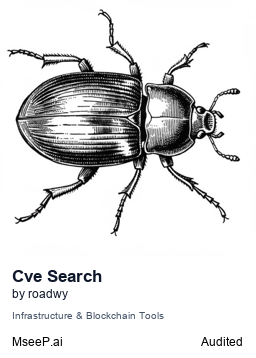About
A Python-based MCP server that exposes the CVE-Search API, enabling clients to retrieve vendor and product listings, specific CVE details, recent updates, and database metadata in JSON format.
Capabilities

The CVE‑Search MCP Server bridges the gap between AI assistants and the vast vulnerability data housed in CVE‑Search. By exposing a clean, well‑structured API through MCP, developers can query real‑time CVE information without embedding complex HTTP logic into their workflows. This is especially valuable for security analysts, threat hunters, and DevSecOps pipelines that rely on up‑to‑date vulnerability data to inform risk assessments or automated remediation actions.
At its core, the server translates standard CVE‑Search endpoints into MCP resources and tools. Users can retrieve a full list of vendors, drill down to the products offered by a particular vendor, and fetch all vulnerabilities associated with a specific product. Additionally, it supports direct lookup of individual CVE IDs and provides a curated feed of the most recent 30 CVEs, complete with CAPEC, CWE, and CPE expansions. The server also exposes metadata about the underlying database—such as versioning information and last‑update timestamps—allowing consumers to gauge data freshness.
Key capabilities are presented as intuitive tools that return JSON payloads, making them immediately consumable by AI assistants. For example, a prompt can ask the assistant to “list all CVEs for Microsoft Office 365”, and the MCP server will return a structured JSON that the assistant can embed in its response or pass to downstream automation. Because the data is sourced directly from CVE‑Search’s official API, users benefit from reliable coverage of public vulnerability records without maintaining their own mirror.
Real‑world use cases include automated compliance checks where an AI assistant cross‑references installed software against known CVEs, or incident response scenarios where the assistant can quickly surface all vulnerabilities affecting a compromised product. In continuous integration pipelines, the server can be queried to flag newly discovered CVEs that affect build artifacts, triggering alerts or blocking deployments until mitigations are applied.
What sets this MCP server apart is its lightweight design and seamless integration with popular MCP‑enabled editors like VS Code through Cline or Roo Code. Developers can add a single configuration entry, and the server becomes instantly available to any AI workflow that supports MCP. The result is a rapid, repeatable path from vulnerability data source to actionable insight—an essential component for any security‑focused AI assistant.
Related Servers
MindsDB MCP Server
Unified AI-driven data query across all sources
Homebrew Legacy Server
Legacy Homebrew repository split into core formulae and package manager
Daytona
Secure, elastic sandbox infrastructure for AI code execution
SafeLine WAF Server
Secure your web apps with a self‑hosted reverse‑proxy firewall
mediar-ai/screenpipe
MCP Server: mediar-ai/screenpipe
Skyvern
MCP Server: Skyvern
Weekly Views
Server Health
Information
Explore More Servers
Actor-Critic Thinking MCP Server
Dual-perspective analysis for balanced creative evaluation
Miro MCP Server
Connect Claude to Miro whiteboards effortlessly
Meeting BaaS API Documentation Server
Serve Meeting BaaS docs on Vercel
Chainlist MCP
Fast, cached EVM chain info for AI agents
Netdata
Real‑time infrastructure monitoring for every metric, every second.
MCP Ripgrep Server
Fast, CLI‑based text search for MCP clients